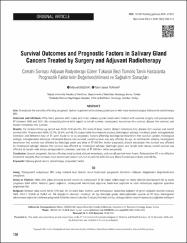| dc.description.abstract | Aim: To evaluate the variables affecting prognostic factors in patients with salivary gland cancer who have received surgery followed by radiotherapy(RT).Materials and Methods: Fifty-three patients with major and minor salivary gland cancer were treated with curative surgery and postoperativeRT between 1993 and 2011. We evaluated patients with regard to overall survival, locoregional recurrence-free survival, disease free survival, anddistant metastasis-free survival.Results: The median follow-up period was 40 (8-174) months. The rates of local control, distant metastasis-free, disease-free survival and overallsurvival after 10 years were 65%, 57,7%, 38,8%, and 48,2%, respectively. In univariate analysis, histological subtype, histologic grade, extraglandularextension and delivered dose of RT were found to be as prognostic factors affecting locoregional recurrence-free survival; gender, histologicalsubtype, extraglandular extension influenced disease-free survival; overall survival was only affected by age. In multivariate analysis, locoregionalrecurrence-free survival was affected by histologic grade and dose of RT (60 Gy< better prognosis); distant metastasis-free survival was affectedby histological subtype; disease-free survival was affected by histological subtype, histologic grade, and lymph node status; overall survival wasaffected by lymph node status, extraglandular extension, and dose of RT (60 Gy< better prognosis).Conclusion: Several prognostic factors affecting local control, distant metastases, and overall survival were found. Postoperative RT is an effectivetreatment modality that increases local control and overall survival in patients with Salivary Gland Carcinoma at doses over 60 Gy. | en_US |



















